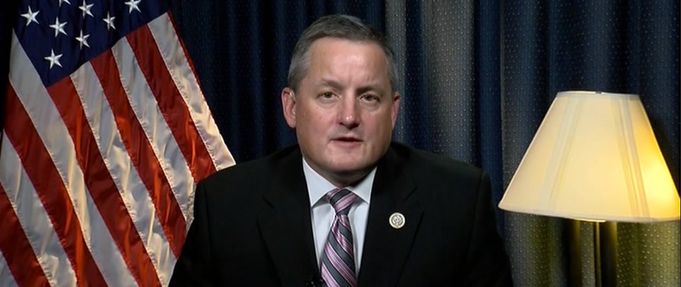Cong. Bruce Westerman on Afghanistan, I-49 delay
by August 25, 2021 7:57 am 1,307 views

U.S. Rep. Bruce Westerman, R-Hot Springs, says the Aug. 31 deadline to withdraw U.S. troops from Afghanistan is arbitrary and unfeasible.
In an interview with Talk Business & Politics on Tuesday (Aug. 24), Westerman said he was fresh out of an intelligence briefing that confirmed his belief that the Biden administration’s Afghanistan withdrawal was impractical.
“No, I do not agree with the August 31st deadline. I don’t think that deadlines should have ever been put in place. I think it was okay to withdraw from Afghanistan, but to do that in a much better planned method using the intelligence that we had and not setting arbitrary deadlines,” he said. “We’ve seen it play out before our eyes, the tragedies that are happening there. And I don’t think we can get all the Americans out by August 31st. And we certainly can’t get all the Afghans out who helped us for 20 years there in Afghanistan.”
Westerman supports emphasizing military strength in dealing with the Taliban to back off their push to overtake control in the country.
“I really hope that the administration and the leadership go back and tell the Taliban we’re not leaving August 31st. We’re going to get all Americans out, and if they don’t like that, they’re going to deal with the consequences,” Westerman said.
The Fourth District Congressman agrees the Taliban were going to be a political force despite 20 years of U.S. nation-building in Afghanistan. The original American establishment in the country came after the 9-11 attacks in 2001. Westerman was uncertain how the political crisis currently being witnessed could have been avoided.
“Whether or not the Taliban would have come back into power or not, I think that’s really hard to answer. I think they would have, but I don’t think they would have done it in this amount of time. And I don’t think we would be scrambling in the panic that we’re in to try to get Americans and those who helped our forces out of the country so quickly,” he said. “I think this could have been done in a way where we left the country to the government that we helped establish in Afghanistan. And if the Taliban and ISIS and Al Qaeda were to come back into power, then that would be on the Afghan government. But this is totally chaotic what’s happened.”
Has 20 years of an American presence in Afghanistan been successful?
“I think you have to look at the good work that the U.S. military did and the fact that we haven’t had terrorist attacks like we saw 9-11, 2001 since we’ve been fighting in Afghanistan. So it wasn’t all for naught, and I believe that when we had a small troop presence there in Afghanistan, and we had the airport and the bases there, that we were able to react quickly to any kind of plans that the Taliban would have to come back in power,” Westerman said.
“I think it’s going to provide a safe haven for these groups to reform, and I think the lesson we can learn is that you can go in and spend a lot of money and spend a lot of our young men and women’s lives in protecting our country, but at the end of the day, these bad actors are still bad actors. They’re going to raise their head back up. This may have seemed the expedient thing to do right now, but I think in the future, we’re going to pay for it again,” he added.
INFRASTRUCTURE, I-49
Westerman is currently opposed to a bipartisan $1.2 trillion infrastructure bill that passed the Senate earlier this month. He wants to see a pared down price tag and more traditional infrastructure spending, although he’s open to broadband.
The longtime, incomplete I-49 project is unlikely to benefit from the current infrastructure proposal, Westerman contends. The interstate highway would be a major corridor for transportation from New Orleans to Kansas City, with big benefits for western Arkansas.
“We’re getting down to where definitely the bulk of the completion of Interstate 49 would happen in the Fourth District and before long, it’ll be the only part of I-49 that’s not complete,” Westerman said.
“There will be no funding, as far as I can see, in that [$1.2 trillion] package that would help with Interstate 49. That makes it very difficult for me to support an infrastructure package, or so-called infrastructure package, when it’s not going to benefit folks in western Arkansas and really all of Arkansas and the region that benefits from having Interstate 49. When we mark the transportation bill up in the House the first time, there was a provision in there that said you could construct no new highways,” he said.
“You could only use the funding to do repairs on existing highways. So to answer your question, though, we’re not getting any closer to doing Interstate 49. We would actually have to go back and redo part of the NEPA [National Environmental Policy Act] analysis. That’s the environmental analysis on building Interstate 49, because it’s so long since that work has been done, it’s frustrating. It doesn’t make sense to me why we wouldn’t prioritize that more, but the infrastructure bill that’s out there now is more about mass transit and being beneficial to urban areas than to rural areas,” he added. “I would like to see the infrastructure bill focused on infrastructure, and to me, that’s roads, highways, bridges, navigable waterways, airports. It would include some mass transit, it would include broadband, but I think we could do a bill closer to a half trillion dollars and do a lot more in those areas than what this bill at $1.2 trillion currently would do.”
Westerman’s interview also discussed COVID-19, controlling forest fires, and Congressional redistricting. You can watch the full interview in the video below.
